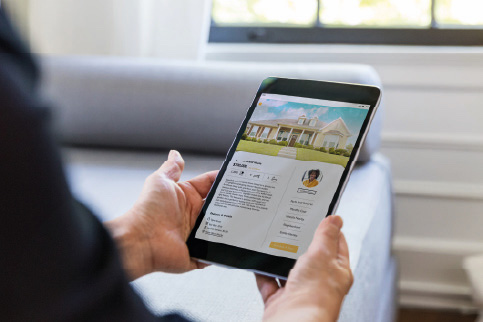

Ever pass by a home and feel your jaw drop? Maybe it has perfect landscaping or an ornate front porch. Whatever it is, you want it. It may not be up for sale, but maybe if you find the owner, they could be open to the right offer.
This article will discuss various methods you can use to track down the owner of a property, plus tips for how to get them to sell once you do.
It can be a long road to find the right house, and even when you do, it may not be for sale. Let’s take a look at a few ways to find out who owns and what to do once you find out.
On your local tax assessor’s official website, you may be able to look up property tax records and find the property owner by their address. You can learn who owns the home as well as how much property tax they pay.
This is a great way to find out who owns a property for free. Keep in mind you may have to pay for physical documents. The tax assessor’s records can also give you an idea of what you’ll pay in taxes if you purchase the property. You could even find out if there is a lien on the property.
The county clerk’s office has public records of property, deeds, land records and other useful information when searching for the property owner. Not only will this tell you the owner of a house, but your county recorder may give you insight into the history of the property.
Your local library may have a database to conduct a property search. This could be available online, or you may be able to find public records in person.
Sites like 411.com and Whitepages offer reverse searches where you can input the address of the home and it will give you a list of who resides there. Please note that the accuracy of these sites can vary.
You may get a list of family members or previous owners. They may require you to make an account and may charge you for the information. Given the unreliable nature of the information, you may be better off accessing records from the assessor’s office or the county clerk.
If you’re already house hunting, talk to your real estate agent. Chances are they’ll access the same public records from the first three steps. If those haven’t turned up results, your agent may have access to tools they can use to dig a bit deeper.
A title company can research property deeds and perform title searches. Not only will you be able to find the owner of the property, but a title search will check for any issues of the property. This step is part of the homebuying process, but you can do it early to find out more information on the property.
Note that a title search isn’t free. You’ll have to pay a fee, usually in the range of $200 – $400.
If the other options on this list haven’t given you satisfactory results, you could talk to a real estate attorney. They may have a few ideas for how to find the property owner if you’re having trouble.
If you’re comfortable, knocking on the door might get you face-to-face with the current homeowner. If the resident isn’t the owner, they may know how to contact the owner. Make sure to be friendly and respectful to the person who answers the door. It’s possible residents or homeowners might find this move unexpected or even invasive, so trying other avenues first is recommended.
If no one answers, consider leaving a note with your contact information asking the owner to get in touch if they’d consider selling. Again, your inquiry might not be welcomed by the current resident, and even if they want to help you they may not have the information you need at the ready. It’s best to try to find out who the owner is through other methods first.
The previous tips might help you find the owners of your dream home, but what if you stumble upon your dream plot of land? An empty land parcel likely won’t have its address displayed, and you may not have the option to knock on the current owner’s door or leave a message in their mailbox.
That doesn’t make it impossible to find the owner, though. Take a look at these methods for finding out the owner of a piece of land.
Before you can ask your local tax assessor, county clerk or city hall about a piece of land and its property records, you’ll need the address of the vacant lot in question. Google Maps can help you find out who owns land around you or around the world.
Google’s satellite and street-view can provide the approximate mailing address of a piece of land, including the latitude and longitude. The satellite view can give you an idea of the plot’s terrain and general features.
Although not all states provide them, online parcel maps provide even more detail about a piece of land. If you’re able, identify the county where the parcel is located. Parcel maps are designed to identify real property boundaries. You may also hear these maps referred to as property maps or tax maps.
Parcel maps provide all kinds of data on property ownership, such as the name of the current owner, the land’s assessed value and whether that land is owned by an individual, a business or the local municipality.
To find your state’s maps, search your state’s name and “parcel map.” You might have to scroll a bit, but it’s likely to be in the top results.
Still having trouble finding the information you want? Consider signing up for an online real estate service. Many property data tools are not only able to pinpoint the current owner, but also provide their current contact information. There may also be valuable information about the land registry listed.
These services charge a monthly fee and a subscription may not be the best option unless you’re planning to start buying investment properties. If you decide to go this route, prepare to invest a significant amount of time and research before you buy.
Newcomers to the world of real estate and land purchasing may struggle with these industry-specific platforms. If you know a nearby investor or agent, consider calling on them for a favor – they may already pay for these services and could point you in the right direction.
An empty parcel of land means you can’t knock on the owner’s door, but you can still ask the neighbors.The might have insights about the property including their experiences with the neighborhood. There’s a good chance they have the owner’s name and contact information. If they’ve been in the neighborhood awhile they might have a phone number or address for the current owner.
Once you find out the owner of a property or land, then comes the challenge of convincing them to sell. There isn’t much you can do if the owner isn’t interested in selling, but if they are, here are some ways to make your offer stand out.
There are several ways to find out who owns the property you’re interested in. If your interest is strong and you know you could make an irresistible offer, make the effort to contact the owner. Getting preapproved or having a Verified Approval Letter can also show you’re a serious buyer and increase your chances of success.
Follow our step-by-step guide to learn how to buy a home.












LMB Mortgage Services, Inc., (dba Quicken Loans), is not acting as a lender or broker. The information provided by you to Quicken Loans is not an application for a mortgage loan, nor is it used to pre-qualify you with any lender. If you are contacted by a lender or broker advertising within our network, your quoted rate may be higher depending on your property location, credit score, loan-to-value ratio, debt-to-income ratio, and/or other factors. Quicken Loans does not offer its matching services in all states. This loan may not be available for all credit types, and not all service providers in the Quicken Loans network offer this or other products with interest-only options. The information that we provide is from companies which Quicken Loans and its partners may receive compensation. This compensation may influence the selection, appearance, and order of appearance on this site. The information provided by Quicken Loans does not include all financial services companies or all of their available product and service offerings. Article content appears via license from original author or content owner, including Rocket Mortgage.
Note: Actions on this website are recorded for quality assurance or training purposes. Input of data constitutes consent.
Quicken Loans is a registered trademark of Rocket Mortgage, LLC, used under license by LMB Mortgage Services, Inc.
LMB Mortgage Services, Inc. | NMLS #167283
4859 W Slauson Ave #405 Los Angeles, CA 90056